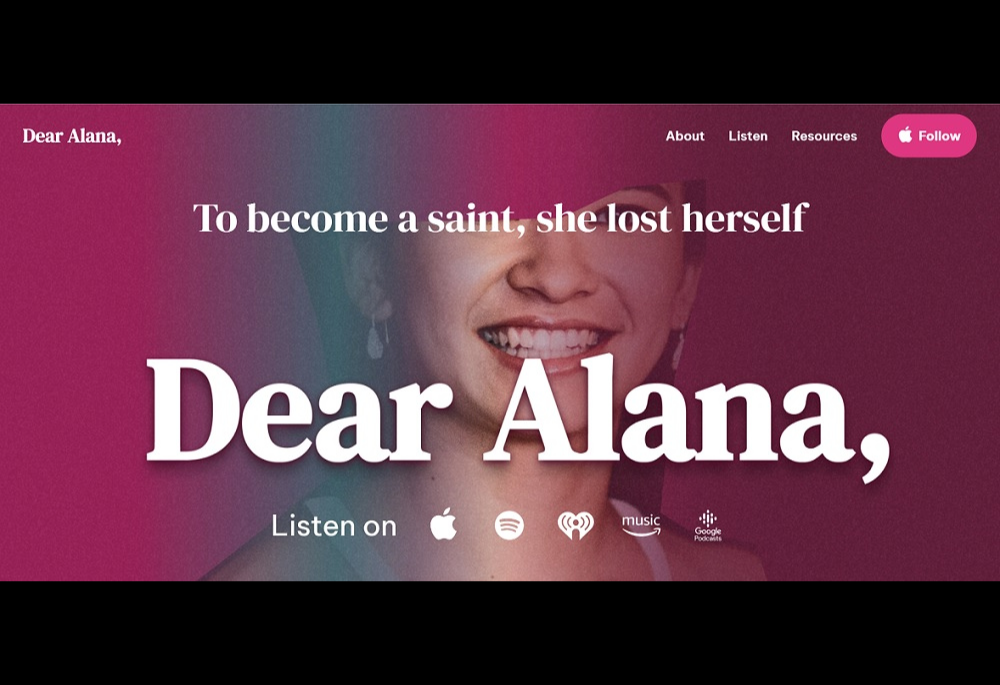
Alana Chen died by suicide in 2019. Although church officials deny engaging in "conversion therapy" with her, Alana's mother insists that priests and other representatives of the church encouraged her daughter to conceal and suppress her sexual orientation. (Photo courtesy of the family)
Editor's note: If you are having thoughts of suicide, call or text 988 to reach the 988 Suicide and Crisis Lifeline or go to SpeakingOfSuicide.com/resources for a list of additional resources.
I was in college when I first came across the writings of Fr. John Harvey, founder of Courage International. I devoured his book The Truth About Homosexuality: The Cry of the Faithful. Harvey, an Oblate of St. Francis de Sales, drew on the prior work of Elizabeth Moberly and Joseph Nicolosi to promote the view that same-sex attraction could — and should — be "healed." I desperately wanted that healing.
But around that time, I became friends with a philosophy graduate student who shared my love of Pope John Paul II's "theology of the body." I shared my interest in Harvey's books and this friend responded with stories of men he knew whose lives and faiths had been destroyed by their pursuit of sexual orientation change efforts. This friend saved me from pursuing conversion therapy.
Not everyone is so lucky.
Alana Faith Chen died by suicide on December 8, 2019, at the age of 24. In his newly released podcast "Dear Alana," which recently hit No. 1 and was Editor's Choice at Apple Podcasts, host Simon Kent Fung explores Alana's life and death — coming to realize that Alana's story is an all-too-relatable one for many in the Catholic church.
"Dear Alana," details how Alana wanted to become a nun as a teenager. As this desire grew, so did her internal conflict. In her senior year of college, she went to an inpatient treatment facility after a suicide scare. With the permission of Alana's mother, Joyce Calvo, Fung reads from the admission notes:
Admin: Does the client have any concerns about her sexuality?
Alana: I am really Catholic. My beliefs, I'm always in conflict.
"Dear Alana," recounts Alana's complicated relationships with various figures in the church. In one episode, Fung discusses with Calvo how she prohibited private meetings between Alana and Fr. David Nix, at the University of Colorado Boulder (where the Catholic Center is referred to as "St. Tom's") after discovering that her daughter had been meeting with him secretly at the age of 14. Fung highlights subsequent text messages between Nix and Alana at age 19, in which the priest sends her selfies and food pictures along with questions about her temptations.
Advertisement
Fung also discusses Fr. Peter Mussett, a charismatic "hipster priest," who took over leadership of St. Tom's after Nix left "for personal reasons." The podcast reads from Alana's journals (also shared with her family's permission):
Fr. Peter told me that I should not identify by my temptations, for the cause is much deeper than I could imagine. The cause was the doubt and isolation. From a young age I did not know God. From a young age I was isolated because of my sexual addiction. I felt so much shame and hopelessness. Because of my parents, I could not relate to them or be known by them. They were too strong and I was weak.
Mussett may or may not have been aware that he was offering Alana key messages from the ex-gay movement: Same-sex desires are symptoms of pathologies, often arising from psychological wounds related to inadequate parental relationships or sexual traumas. And though he was not qualified to provide mental health diagnoses, he convinced young Alana that her desire to masturbate was an "addiction."
Both Alana and her mother seem to have taken from all of this that the Catholic view of homosexuality involves pathologizing efforts to "heal" (with a possible shift toward heterosexuality as a positive side effect).
Such pathologizing and efforts are what many people refer to as "conversion therapy." Alana wrote in her journals that she later came to realize she had been subjected to conversion therapy.
Some might hear of Alana's death and insist that we can't know for sure why she took her life. But the release of 'Dear Alana,' makes continued ignorance look increasingly intentional.
Calvo has sought accountability from the Denver Archdiocese, the Sisters of Life (who recommended a therapist to Alana who provided conversion therapy), St. Tom's, Nix, Mussett and others for driving Alana toward conversion therapy and the anguish that led to her death.
Alana did everything prescribed to her to "heal from same-sex attraction," and developed such self-hatred that she cut the word "DEFILED" into her arm. All five denied "practicing or suggesting conversion therapy in the case with Alana."
On his personal blog, Nix has scrutinized Calvo's public statements and Facebook posts, and he wrote that the suicide happened "because Alana was barred from her parish by her own controlling mother."
The Denver Archdiocese, responding directly to Calvo, has said that the mother's attempt to "hold one group responsible seems pretty irresponsible." Like Nix, the archdiocese publicly chastises the grieving mother.
Observing all of this, "Dear Alana," succeeds in its empathetic and nuanced storytelling. During one of their many conversations on the podcast, Calvo asks Fung whether the Legionaries of Christ, under whom Alana's priest-appointed therapist received professional training, are "anti-gay."

Alana Chen's story is told in an eight-episode podcast, which began releasing one episode at a time in mid-August. "Dear Alana," was created, hosted and produced by Simon Kent Fung. (NCR screenshot)
Fung resists simple answers to complicated questions. "They're part of this cluster of many different institutions and organizations that are faithful to the teachings of the church," he answers. "Right? So their training and how they are told to counsel people will be within those frameworks."
The fact is, while the church does not officially endorse the ideologies promoted by the conversion therapy movement (the catechism states that the psychological genesis of homosexuality remains largely unknown), many Catholics do. "Dear Alana," observes how complex ex-gay ideology can be, with such spaciousness as to allow individuals to promote and even practice conversion therapy without realizing what they're doing.
Fung shares clips of writers such as Nicolosi, Moberly and others to underscore the subtlety of the ideologies behind conversion therapy, and the ways in which they can seduce vulnerable LGBTQ+ Christians and their communities.
But if there has been space in past years for church leaders to claim ignorance about the harm these ideologies cause to LGBTQ+ people, that space is quickly dissolving.
Some might hear of Alana's death and insist that we can't know for sure why she took her life. But the release of "Dear Alana," which engages Alana's diaries as well as her close family and friends, makes continued ignorance look increasingly intentional.
Many queer Catholics, including myself, have been telling the church: "I know why people like Alana die! Because I've felt that way! I've almost done that!"
This is partly why Fung's own story as the podcast host is so important in the telling of Alana's. If the Denver Archdiocese or the Sisters of Life or any other church institution wants to know how someone like Alana might have gotten to where she did, they would be wise to ask someone who could intimately relate to her world. If these institutions want to know, they can talk with Fung. So far, they haven't.
Nonetheless, we will keep speaking. I joined the "Dear Alana," impact team because I believe in the power of these stories. "Dear Alana," gives Alana Faith Chen an opportunity to speak to the church about how we can — and must — change. We failed to hear her before. Let's not fail her now.








